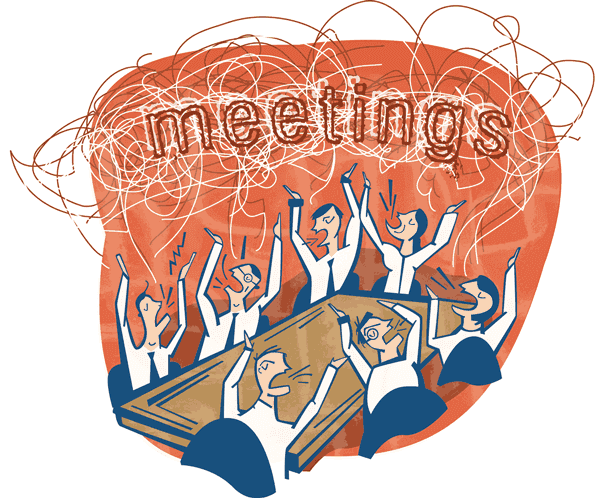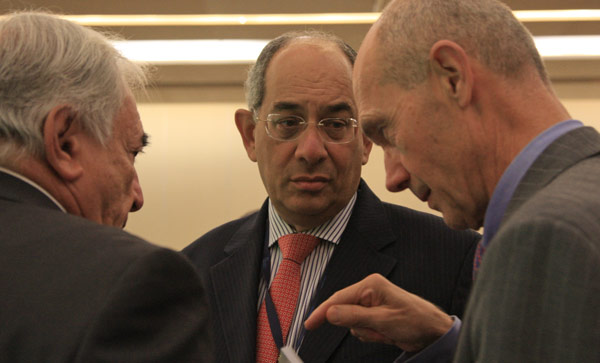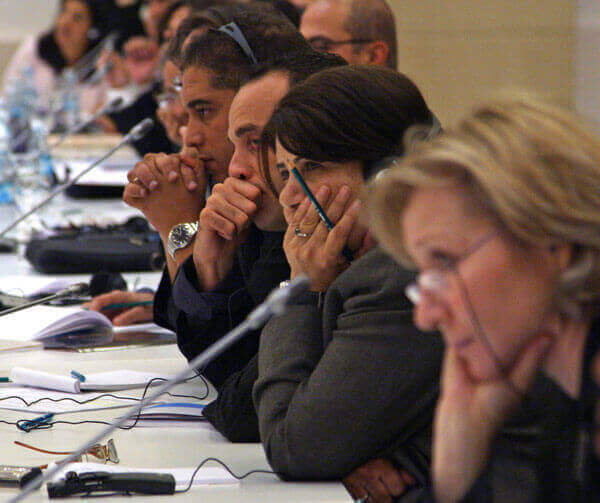Business Meetings in English – Your Complete Survival Guide
By Sarah Li Cain
Do you ever feel lost or anxious when you’re in a meeting with other English speakers?
Even if you are comfortable speaking in front of others in your own language, expressing your thoughts effectively or leading a successful meeting in English can be difficult.

This guide will provide you with example English phrases and useful tips that you can use at your next business meeting.
I will also help you to prepare for the most common situations that you will face, and what to avoid.
Mục Lục
How to Use this Survival Guide
The more prepared you are for a meeting, the more confident you feel, which in turn helps you to lead a successful and stress-free meeting.
This guide covers 4 parts:
- First you will learn some commonly used English phrases – such as how to say your message effectively, how to keep the group focused on the topic, and how to transition.
- Second we will look at some phrases that you must avoid
- Then we will go over some tips for running a good meeting.
- Lastly we will look at an example, and show you how to manage and participate in your next meeting with confidence.
1. Useful Phrases
Below you will find some of the most useful phrases you can use in business meetings, divided into categories.
Try to learn some of them, or review them before your meeting to refresh your memory and boost your confidence:
Introductions and Openings
Used to begin a meeting and welcome the participants.
Examples:
-Good morning/afternoon everyone.
-Since everyone is here, we can begin.
-Can we all welcome John, our new IT manager?
-I would like to extend a warm welcome to our VP of Sales, John.
Stating Objectives and Introducing the Agenda
This sets the tone of the meeting and keeps it focused.
Stating Objectives:
-Today, we are here to discuss last month’s sales.
-I’ve called this meeting so we can review the most recent project.
-By the end of this meeting today, we should have completed…
Introducing Agenda:
-Does everyone have a copy of the agenda?
-There are seven items on our agenda. Let’s start from the beginning.
-If it’s ok with everyone, I would like to start with the second point, last month’s sales numbers.
Clarifying or Repeating Points
Whether you are leading or participating in the meeting, it is important to make sure everyone understands.
Examples:
-Was that clear to everyone?
-If we look at it from this perspective, does that make more sense?
-Can I make that easier to understand?
-I will repeat for clarification…
-Because these are important points, I will repeat them.
Sharing and Asking for Opinions
The reason for a business meeting is productive discussion. Encourage discussions by asking for participants’ opinions and sharing your own.
Sharing an Opinion:
-I (really) feel that these sales figures are encouraging.
-If you ask me, I think that we should focus on…
-In my opinion, this idea is …
Asking for an Opinion:
-Do you agree with this initiative?
-I’d love to get some ideas from everybody
-Sue, could you share your opinion on these ideas?
-John, how do you feel about this marketing plan?
Agree or Disagree with Points Made
Agreeing or disagreeing means people are listening. Always make sure that both sides of the argument are heard.
Agreeing:
-That’s a great point
-I could not agree more.
-That is exactly what I was thinking.
-I must agree with Sue on this idea.
-That sounds like a great idea
Disagreeing:
-Unfortunately, I do not see it the same way.
-I agree with you in part, but
-I can’t agree with you because I think.
Negotiating and Compromise
These are some of the most important parts of many business meetings. Know how to negotiate respectfully and how to compromise.
Negotiating:
-I will need to take more time to consider your offer.
-I can accept your terms on these conditions…
-I see your point, but I think we are better off by.
Compromising:
-I understand, and I am willing to compromise on these points.
-What do you think if we were to do this instead?
-This is what I am willing to offer in order to move this deal forward.
Interrupting to Comment or Ask a Question
Questions are a productive part of any meeting, but interrupting can be a major distraction. Ask for permission to interrupt if you need to clarify something or make an important comment.
Interrupting:
-May I have a word on this topic?
-If I may, I think that we should discuss this…
-Excuse me for interrupting, but could you clarify the marketing plan again?
-May I add something about last month’s sales report here?
Questions to Facilitate Discussion
Contributions from the participants is necessary not only to keep the meeting productive but also to make those participants feel welcome and a part of the group.
Asking for Contributions:
-We haven’t heard from you yet, John. Do you mind sharing your thoughts?
-What do you think about the numbers from last month?
-Would you like to add anything about these figures, Sue?
-John, what do you think about this?
-Does anyone have any comments on this point?
-Is there anything else anyone else would like to add?
Managing Participants and Time Frame
Keeping meetings on time is difficult, so these phrases can keep the meeting on schedule.
Participant Management:
-John, please be brief with your comments.
-Let’s get back to the topic of marketing, shall we?
-We are not here to discuss marketing today.
Time Management:
-We are running out of time for this meeting.
-Well, that is all the time we have for today’s meeting, but let’s discuss that next time.
-I’m afraid we’ve run out of time for today, but our next meeting will be Monday morning.
Summarizing the Meeting Points
It is important to briefly summarize what was discussed, and the actions for the next meeting.
Summarizing:
-Before we go, let me summarize what we have decided on.
-To sum up the meeting, we discussed points A, B, and C.
-Shall I review today’s important points?
Assigning Action Items
There are normally some tasks that need to be completed after a meeting.
Action Items:
-We should really prepare these numbers for our meeting next week.
-Let’s focus our attention on completing these changes in the marketing plan by Friday afternoon.
-Would you mind taking care of the report by Thursday morning?
-I look forward to your report at our meeting next week, Sue.
You can also download your free PDF copy of this list of useful phrases:
Download the Meetings Phraselist
Most Important Phrases

If learning all phrases seems intimidating, don’t worry. Some phrases are more important than others, so focus on learning those first.
Then you can take your time with the other phrases, so you don’t feel so overwhelmed.
The most important phrases are:
- Clarifying what a participant or meeting leader has said is crucial for all members of the meeting. In most cases, if you did not understand what someone said, it is likely that another member of the group also has the same problem.
Using these phrases can ensure the entire group understands what is going on and that the message is clear. - Asking participants for their contributions creates an environment where everyone feels that their input is not only important, but wanted.
Use the phrases above to ask for specific comments or feedback, and make sure to take note of those contributions. - Assigning action items is one of the crucial differences between effective and ineffective meetings.
It is great to get the team together to speak about specific projects or critical company issues, but without putting those discussions into action, they are worthless.
2. Phrases to Avoid in Business Meetings

We’ve spent quite a bit of time reviewing what phrases work well in business meetings, but there are also some phrases that should be avoided.
Review this list before your next meeting so you don’t accidentally use them.
“No one agrees with you on that”
The first rule of a meeting is to keep the tone positive and upbeat. Telling a person that no one supports their idea or agrees with their opinion will drastically shift the tone of the meeting. It will also make other members of the group feel that their opinions or ideas won’t be received well, either.
“That is a secondary issue”
This phrase, although it may be used with the best intentions in order to keep a meeting on time or on task, sounds rude. It makes people feel like what they have to say are not important.
If someone brings up a topic that is off task, simply thank them for their contribution and suggest that it may be best to discuss that topic in another meeting, or one on one. This will not only acknowledge that participant’s comments or question, but will also keep the meeting focused and on time.
“I’m in charge here”
You very well may be the chairperson of the meeting, but declaring that you are in charge is rude and also deters others from asking questions or adding value to the meeting. Keeping a meeting on topic can be done more effectively with the phrases listed above.

“Let’s have a follow up meeting”
The purpose of a business meeting is to present information, and ultimately, come to a resolution, make a decision, or create a plan for a specific problem. Instead of ending a meeting with the proposal of yet another meeting, it is more productive to assign action items to the meeting participants so that any subsequent discussion is as productive as possible.
3. Business Meeting Tips
Speaking English in front of native English speakers is hard enough, let alone also making sure the meeting runs smoothly.
You want to appear friendly and knowledgeable, and not boring – as many people believe meetings are.

It doesn’t matter if you are updating the team about a project in progress, or have an innovative idea to present to overseas clients, keep in mind the following tips:
- Keep the meeting positive and upbeat
Nobody wants to sit through a boring meeting, especially one that encourages a negative environment. Make sure you are keeping the tone of the meeting positive.
Many people from North America appreciate lighthearted jokes or conversations about their day, so make sure to include that before or after the meetings. - Address the entire group
It can be hard to shift your attention – and eye contact – to and from each person in the room. It is much easier to set your gaze on one or two colleagues at the end of the conference room table.
However, making eye contact with everyone in the room keeps everyone’s attention, and they feel included. When people feel a connection with the speaker or presenter (that’s you!), it is more likely that they will listen to your message. - Encourage feedback
Business meetings are meant to be a group effort, not simply one person talking. If you are leading the meeting, leave room for feedback in between your main points and for questions at the end.
This is especially important if your meeting includes Europeans or Americans – the more the entire group is engaged, the more effective the meeting will be. People from native English speaking countries can be very willing to give their opinion, so expect lots of conversations. - Watch your time
Everyone has taken time out of their day to be present, and everyone has more work to do once the meeting has concluded. Be mindful of the set end time, and stick to it.
Depending on what country you’re from, some countries (like the UK and the US), like to be very punctual. If you say the meeting starts and ends at a certain time, you need to adhere to that schedule. - Don’t forget your body language
If you are slouched over the conference table or have your arms folded in front of your chest, others may take this as you don’t care, or don’t want to work.


4. Putting a Conversation Together
So now you know lots of useful phrases and words for meetings, but how do they go together?
Here is an example conversation between 4 participants to help you see how they work:
Chair: Good morning everyone. First of all, I would like to extend a warm welcome to Bob, the Vice President of Sales in our US branch.
Bob: Thanks for having me.
Chair: Let’s talk about today’s agenda. If it’s ok with everyone, I’d like to start with the second point. Bob, can you please talk about the sales reports from each district?
Bob: Sure, I’d love to … (presents findings on PowerPoint – if you would like to learn more about creating great presentations in English, you can check out our guide here).
Chair: Thank you very much Bob. Now I’d love to get some ideas from everybody. How do you feel about those results? Is there anything we can all do as a team to improve sales in our own districts?
Participant 1: I feel that we have been focusing too much on younger customers. In my opinion we need to focus our advertising on an older market, around 35-40 age group.
Participant 2: I’m sorry, I didn’t catch that. Could you repeat that, please?
Participant 1: I said that we need to focus our advertising on the 35-40 age group.
Participant 2: Unfortunately, I see it differently. I think that we are not focused enough on younger customers. Our advertising is not reaching the 25-34 age group, and we need to update our advertising channels.
Chair: What do you think about this point, Bob?
Bob: That’s a great point about the wrong channels. However, I think we need to focus more on our older customers.
Chair: Is there anything else anyone would like to add?
Participant 1: I understand, are you willing to compromise? We can try the same marketing campaign we have been using for the younger group, but instead target it at the 35-40 age group. We can test that and see what results we get.
Participant 2: That sounds like a great idea.
Chair: Great. Well I’m afraid we have run out of time for today. Before we go, let me summarize the main points …
Chair: Let’s focus our attention on completing the campaign in two weeks. Bob, would you mind taking care of setting up the new marketing campaign by Monday? Thank you all for coming.
—
Did you see how the phrases from the table above were used in the conversation?
Why not download the meetings phraselist and place it side by side on your screen with the conversation above, or even print it out.
Now re-read the conversation and try to match the phrases on the list with how they are used in the example conversation.
Conclusion
Being in a business meeting with English speakers doesn’t have to be scary if you understand what phrases are important and what phrases to avoid.
Remember, you don’t need to know everything in this article right now. Review the most important phrases first, and then slowly build up your knowledge.

Not only will your boss appreciate how well you run meetings, but the people who are in the meeting will as well.
Are there any important phrases that are missing from the list above? What worries you the most about meetings? How did your last meeting in English go? Let us know in the comments below!















![Toni Kroos là ai? [ sự thật về tiểu sử đầy đủ Toni Kroos ]](https://evbn.org/wp-content/uploads/New-Project-6635-1671934592.jpg)


